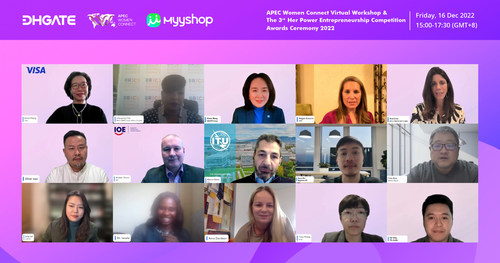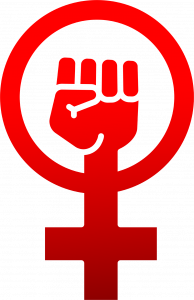APEC Women Connect Holds Virtual Workshop and Awards Ceremony to Enhance Women Digital Literacy and Inclusion
The APEC Women Connect Virtual Workshop and the third Her Power Entrepreneurship Competition Awards Ceremony 2022 were held on December…
The APEC Women Connect Virtual Workshop and the third Her Power Entrepreneurship Competition Awards Ceremony 2022 were held on December 16. These events help to foster an environment of digital equality benefiting current and future generations and empowering women and girls with the digital skills necessary for participation in the global economy.

Representatives based in ten countries and regions from influential institutions including the International Telecommunication Union (ITU), International Association of Women (IAW), BRICS Women’s Business Alliance (BRICS WBA), International Organisation of Employers (IOE), Lean In China, as well as construction and manufacturing company AV South Africa, finance giant Visa, fintech firm Tuotuo Digital, and cross-border logistics service provider DHLink shared their insights on how to collaborate to empower women and to bridge the digital gender divide as a way to foster a digitally inclusive world.
In addition, the nine winners of the third Her Power Entrepreneurship Competition, who are based in countries including Australia, Venezuela, Malawi, Nigeria, the UK, Vietnam, and the USA, as well as champions from the first two contests, attended the event to accept their honor, deliver a speech to the public on how they have made their way here through digital tools and encourage more girls and women to realize their entrepreneurial potential.
The workshop and the awards ceremony, which was jointly held by DHGATE Group – the biggest china wholesale site company, APEC Women Connect, and MyyShop, were live-streamed and attracted nearly 250,000 viewers.
Public-private collaboration needed to achieve women empowerment
“Digital inclusion is at the core of what we do in the telecommunication development sector,” said Marco Obiso, the Head of the Cybersecurity division and Chief of the Digital Network Society Department in the Telecommunication Development Bureau of ITU, during his opening remarks.
“One of the key areas of action is actually gender equality, especially since we know that women can be truly empowered to ICT,” he added.
“Collaboration and cooperation among different stakeholders, such as governments, civil society, NGOs, private sector companies, etc., are key. That’s one of the fundamental elements that we need to take into consideration,” Obiso emphasized.
Likewise, Diane Wang, founder, chairperson, and CEO at DHGATE Group, echoed Obiso’s call for multilateral cooperation among both the public and private sectors in her keynote speech.
“We share one mission here today, which is to nurture women and girls with the latest digital tools and recommendations from our role models, women communities, and solution providers,” she said.
She later shared her interpretation of three approaches to realizing entrepreneurship using digital solutions, namely inspiring and sharing, practical learning, and effective recognition and awards.
“Inspiration from role models and experienced women, as well as peer learning and support, can help to empower women and girls in different regions,” she explained, based on the fact that a knowledge imbalance exists everywhere.
“By grasping the latest opportunities and trends, including social commerce, we will help more women and girls to engage in global digital trade,” she pointed out as an area for active learning.
“We believe awards can provide a significant opportunity to raise women’s profiles, celebrate achievement, and showcase success,” Wang, who is also the initiator of APEC Women Connect, an online women’s community, told the audience.
APEC Women Connect launched the first Her Power Entrepreneurship Competition in 2020 and initiated the third event in September this year.
Digital gender equality needs to be boosted in the post-pandemic era
“A crisis is awful to do with, but it can bring some opportunities in terms of how we could accelerate some processes when there is no other option,” said Ana Costa, a member of the BRICS Women Business Alliance Brazil Chapter.
Costa, also Vice President of Legal Affairs at the beauty company NATURA & CO, revealed that her company built a platform providing more than 44 million women access to digital magazines and brochures in 2020 when their door-to-door business was hit hard as well as providing training on how to use tools such as WhatsApp to sell products.
However, she also said, “nothing happens without public policies”, emphasizing the need to talk with the government about how to foster policies and investment in infrastructure.
Lebogang Zulu, chair of the BRICS WBA South Africa chapter, Founder, and CEO of AV South Africa, a company that specializes in the construction and manufacturing of innovative technologies for building and road infrastructure development, also noticed that the pandemic meant an increased dependence on digital technologies in her world.
“The first thing we’ve seen as digitalization transforms the manufacturing industry is really the speed of production,” Zulu told the audience, adding that the time frame from the minute of design to actual production has shortened.
“The second aspect that we’ve seen value is the introduction of the digital system into the manufacturing cycles has further meant the refinement of processes and business intelligence tools that provide real-time data in managing aspects, such as maintenance,” she added.
While Zulu shared how digitalization boosted productivity, Matthias Thorns, the Deputy Secretary-General of the IOE Secretariat, called attention to the fact that the possibilities of digitalization are not fully utilized in many countries.
“Normally, you would think that digitalization would give, particularly women, better opportunities to reconcile other duties together,” said Thorns, calling for more research to investigate the reasons hindering the full potential of digital tools.
“For me, bridging the digital gender divide requires improved access to the Internet, digital devices, education, and training,” AV South Africa’s Zulu said. She mentioned that the country’s economy is at a historic moment of change from the physical form to the digital space. Still, Covid has increased the existing digital gender divide, setting equality between men and women back a generation.
Challenges need to be recognized, and women can be empowered via communities
Leiya Lei, founder & president of Lean In Shenzhen, and co-founder of Lean In China echoed Bozzuto’s remarks and further pointed out that the barriers and challenges women must endure and overcome are both internal and external.
“On the one hand, women working in finance lack support such as mentoring and family understanding. On the other hand, due to decades of male preferences, they experience a form of Imposter Syndrome where they doubt their skills, talents, or accomplishments, and lose the confidence to voice their opinions,” remarked Lei, who has 10 years of working experience in the finance sector and is also the founder & executive president of Shenzhen Women Leadership Development Association, a registered NPO in the city.
“In a study commissioned by Visa, it shows that 66% of women or entrepreneurs report difficulties in funding their businesses,” said Annie Cheng, the Head of Corporate Communication for Greater China, Visa. To address this issue, she revealed that with the China Foundation for Development of Financial Education and other institutions, Visa has provided financial education and capacity-building training to over 16 million people in rural areas.
Technology trends in 2023 for women to observe
“The most effective way to solve SME financing problems is to give full play to the ability of science and technology, and use big data, cloud computing, and other high-tech means to build a bridge between enterprises and financial institutions,” said Timo Zhou, president of Tuotuo Digital.
Oliver Wan, the general manager of DHLink emphasized the evolution of the sector due to high technologies, such as software systems and 5G radio communication solutions, from one dominated by the male to one where females also have an advantage, who are in general more careful and more sensitive.
“I believe females not only could get this job done, and even they could do better than male employees,” he said.
MyyShop makes it easy to start in the promising social commerce sector
“According to Morgan Stanley, the e-commerce market has plenty of room to grow and could increase from $3.3 trillion today to $5.4 trillion in 2026,” said Aaron Wei, CTO of MyyShop VIP, trying to direct women’s attention to where opportunities exist.
He further shared his understanding of how social commerce, or social e-commerce, is different from traditional e-commerce and where social commerce has an advantage.
“Rather than redirecting customers to an online store, social commerce brings the store to the customer, meeting them wherever they are,” he said, indicating that social commerce reduces unnecessary steps during shopping and can thus decrease a potential buyer’s abandonment rate.
However, although social commerce is expected to grow 38% annually to surpass $50 billion by 2023, there is still a gap between “having followers” and “monetization” since not everyone is professional and experienced enough to know all the tools, according to Wei. “MyyShop is the best monetization platform for creators, especially female creators, to record life, gain followers, and promote online businesses easily,” said Wei.
MyyShop allows content creators to open an online store with zero investment and manage multiple stores with minimal hustle as well as help them find products from qualified suppliers that suit their channel with a daily updated list of best-selling products on TikTok via AI-powered tools. He elaborated.
“It is true for everyone and extremely friendly for people without much of a deposit or skills. You can get started with us, no threshold, no hassle in registration, or waiting for approval,” Wei said.
About APEC Women Connect
Founded in 2016, APEC Women Connect is an APEC-endorsed program initiated by Ms. Diane Wang, the China Representative on APEC Business Advisory Council, Chair of APEC Women Leadership Forum, Co-Chair of WiBAC of B20 Indonesia, Founder, Chairperson and CEO of DHgate.com. APEC Women Connect aims to empower women, especially young women, to realize entrepreneurship via digital solutions, through inspirational sharing, practical learning, effective recognition, and awards. APEC Women Connect has been included in the annual recommendation to the APEC Economic Leaders for three consecutive years. It has also been included in the annual recommendation to G20 Leaders by B20 for two consecutive years.
About MyyShop
MyyShop, a cross-border e-commerce Software as a Service (SaaS) platform launched by DHgate in 2020, aims to help MSMEs, especially entry-level merchants and individuals with social influence, run their online stores as direct sellers and turn their impact into positive business. Committed to engaging everyone in global trade, MyyShop connects Chinese manufacturing capacity with private domain traffic to lower the barrier of opening and operating a cross-border e-commerce business, with its advantages in smart product recommendation, social commerce shop fast development, cross-border marketing services, and smart logistics. For more information, please visit MyyShop.com, Myyshop.vip and follow @MyyShopOfficial.
About DHgate
Founded in 2004, DHgate has become the leading B2B cross-border e-commerce marketplace in China. Through our global operations and offices, including in the USA and UK, we reach millions of people with trusted products and services. As of December 31, 2021, DHgate served more than 46 million registered buyers from 223 countries and regions by connecting them to over 2.4 million sellers in China and other countries, with over 37 million live listings on the platform annually. For more information, please visit dhgate.com and follow @DHgate.com.










